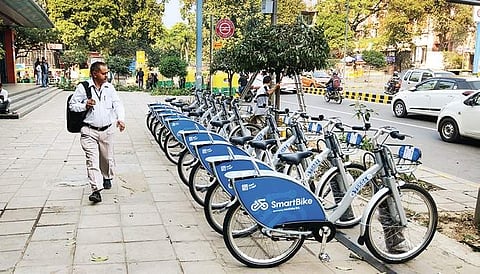

CHENNAI: Could cycling become the new norm following the COVID-19 pandemic? In the wake of social distancing, personalised forms of transport are expected to increase and policy makers are trying to promote cycling as a clean and healthy mode of transport.
It is learnt that the Centre is considering promoting cycling following a study by the Institute for Transportation and Development Policy (ITDP) which states that cycling will increase by 50 to 60 per cent in cities across India post lockdown. A communique from the Ministry of Housing and Urban Affairs to states has highlighted how investment in cycling infrastructure has economic benefits up to 5.5 times the initial amount pumped in.
"Cycling for short distances can result in an annual benefit of Rs 1.8 trillion to the Indian economy and it also has the potential of increasing personal fuel savings by over Rs 27 billion," the communique stated.
Sources said that the Smart Cities Mission and Ministry of Housing and Urban Affairs along with the ITDP have initiated the IndiaCycles4Change Challenge last month and a portal is to be launched on Friday to promote cycling across Indian cities.
This also comes as cycling in Chennai has declined from six percent in 2008 to 2.9 percent in 2018 as per figures available in the draft policy of the Comprehensive Mobility Plan (CMP) for the Chennai Metropolitan Area.
Sivasubramaniam Jayaraman, manager, transport systems, ITDP India, said that the importance of cycling and walking infrastructure has already been realised by the Tamil Nadu government and this has been reflected in the CMP and projects like complete street implementation. Now it is time to work on behavioural changes and this needs to come from citizens who must inculcate cycling culture in their daily activities.
According to a draft final report of the Comprehensive Mobility Plan accessed by The New Indian Express, plans are on to have 183 km of dedicated non-motorised vehicle lanes along with 268 km of shared routes connecting important activity centres and trip attractors. The bicycle tracks proposed in the city are dedicated track (segregated), dedicated track with only lane markings and shared bycycle track with signages based on the traffic and right of way constraints.
K P Subramanian, a former professor of urban engineering at Anna University, said cycling can't be promoted in bits and pieces. Stating that cycling is on verge of extinction, he said cycle tracks should be promoted in middle income group areas rather than in Anna Nagar which is a high income group area. The governmnt should undertake a study in this regard, said the professor. He said that in addition to building cycle tracks, the government should also stop their encroachment by people parking their vehicles.